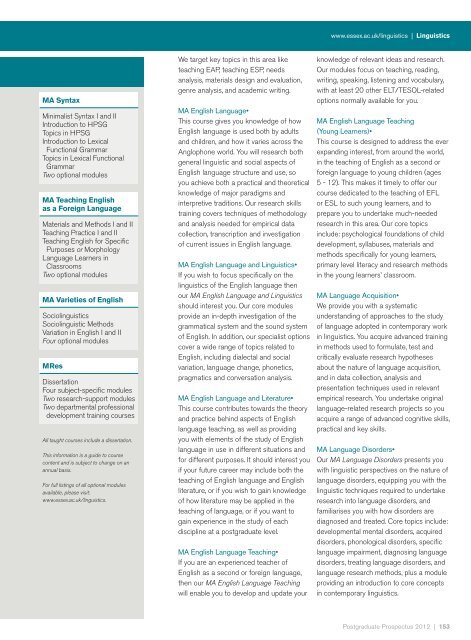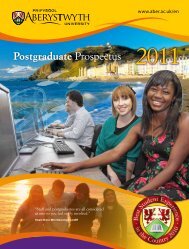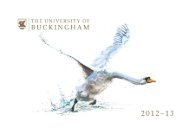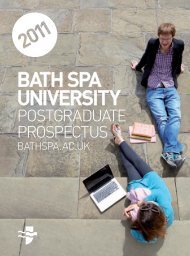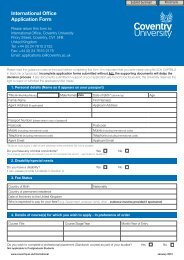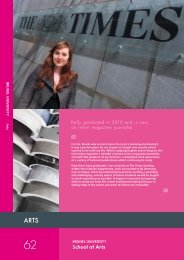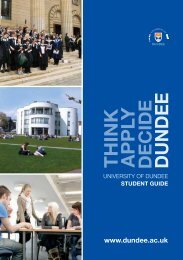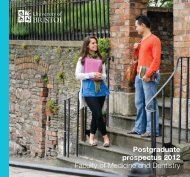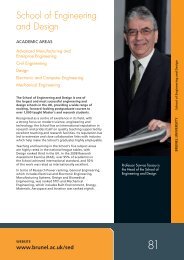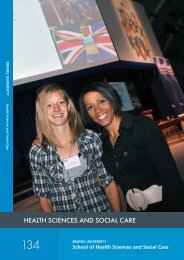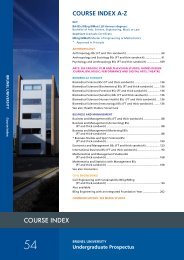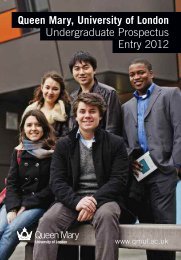Postgraduate Prospectus
Postgraduate Prospectus
Postgraduate Prospectus
Create successful ePaper yourself
Turn your PDF publications into a flip-book with our unique Google optimized e-Paper software.
www.essex.ac.uk/linguistics | Linguistics<br />
MA Syntax<br />
Minimalist Syntax I and II<br />
Introduction to HPSG<br />
Topics in HPSG<br />
Introduction to Lexical<br />
Functional Grammar<br />
Topics in Lexical Functional<br />
Grammar<br />
Two optional modules<br />
MA Teaching English<br />
as a Foreign Language<br />
Materials and Methods I and II<br />
Teaching Practice I and II<br />
Teaching English for Specific<br />
Purposes or Morphology<br />
Language Learners in<br />
Classrooms<br />
Two optional modules<br />
MA Varieties of English<br />
Sociolinguistics<br />
Sociolinguistic Methods<br />
Variation in English I and II<br />
Four optional modules<br />
MRes<br />
Dissertation<br />
Four subject-specific modules<br />
Two research-support modules<br />
Two departmental professional<br />
development training courses<br />
All taught courses include a dissertation.<br />
This information is a guide to course<br />
content and is subject to change on an<br />
annual basis.<br />
For full listings of all optional modules<br />
available, please visit:<br />
www.essex.ac.uk/linguistics.<br />
We target key topics in this area like<br />
teaching EAP, teaching ESP, needs<br />
analysis, materials design and evaluation,<br />
genre analysis, and academic writing.<br />
MA English Language•<br />
This course gives you knowledge of how<br />
English language is used both by adults<br />
and children, and how it varies across the<br />
Anglophone world. You will research both<br />
general linguistic and social aspects of<br />
English language structure and use, so<br />
you achieve both a practical and theoretical<br />
knowledge of major paradigms and<br />
interpretive traditions. Our research skills<br />
training covers techniques of methodology<br />
and analysis needed for empirical data<br />
collection, transcription and investigation<br />
of current issues in English language.<br />
MA English Language and Linguistics•<br />
If you wish to focus specifically on the<br />
linguistics of the English language then<br />
our MA English Language and Linguistics<br />
should interest you. Our core modules<br />
provide an in-depth investigation of the<br />
grammatical system and the sound system<br />
of English. In addition, our specialist options<br />
cover a wide range of topics related to<br />
English, including dialectal and social<br />
variation, language change, phonetics,<br />
pragmatics and conversation analysis.<br />
MA English Language and Literature•<br />
This course contributes towards the theory<br />
and practice behind aspects of English<br />
language teaching, as well as providing<br />
you with elements of the study of English<br />
language in use in different situations and<br />
for different purposes. It should interest you<br />
if your future career may include both the<br />
teaching of English language and English<br />
literature, or if you wish to gain knowledge<br />
of how literature may be applied in the<br />
teaching of language, or if you want to<br />
gain experience in the study of each<br />
discipline at a postgraduate level.<br />
MA English Language Teaching•<br />
If you are an experienced teacher of<br />
English as a second or foreign language,<br />
then our MA English Language Teaching<br />
will enable you to develop and update your<br />
knowledge of relevant ideas and research.<br />
Our modules focus on teaching, reading,<br />
writing, speaking, listening and vocabulary,<br />
with at least 20 other ELT/TESOL-related<br />
options normally available for you.<br />
MA English Language Teaching<br />
(Young Learners)•<br />
This course is designed to address the ever<br />
expanding interest, from around the world,<br />
in the teaching of English as a second or<br />
foreign language to young children (ages<br />
5 - 12). This makes it timely to offer our<br />
course dedicated to the teaching of EFL<br />
or ESL to such young learners, and to<br />
prepare you to undertake much-needed<br />
research in this area. Our core topics<br />
include: psychological foundations of child<br />
development, syllabuses, materials and<br />
methods specifically for young learners,<br />
primary level literacy and research methods<br />
in the young learners’ classroom.<br />
MA Language Acquisition•<br />
We provide you with a systematic<br />
understanding of approaches to the study<br />
of language adopted in contemporary work<br />
in linguistics. You acquire advanced training<br />
in methods used to formulate, test and<br />
critically evaluate research hypotheses<br />
about the nature of language acquisition,<br />
and in data collection, analysis and<br />
presentation techniques used in relevant<br />
empirical research. You undertake original<br />
language-related research projects so you<br />
acquire a range of advanced cognitive skills,<br />
practical and key skills.<br />
MA Language Disorders•<br />
Our MA Language Disorders presents you<br />
with linguistic perspectives on the nature of<br />
language disorders, equipping you with the<br />
linguistic techniques required to undertake<br />
research into language disorders, and<br />
familiarises you with how disorders are<br />
diagnosed and treated. Core topics include:<br />
developmental mental disorders, acquired<br />
disorders, phonological disorders, specific<br />
language impairment, diagnosing language<br />
disorders, treating language disorders, and<br />
language research methods, plus a module<br />
providing an introduction to core concepts<br />
in contemporary linguistics.<br />
<strong>Postgraduate</strong> <strong>Prospectus</strong> 2012 | 153


